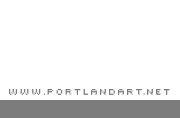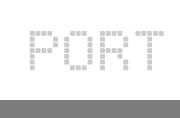
|
||
|
Portland art blog + news + exhibition reviews + galleries + contemporary northwest art
|
||
East/West interview with galleryHomeland by Gary Wiseman 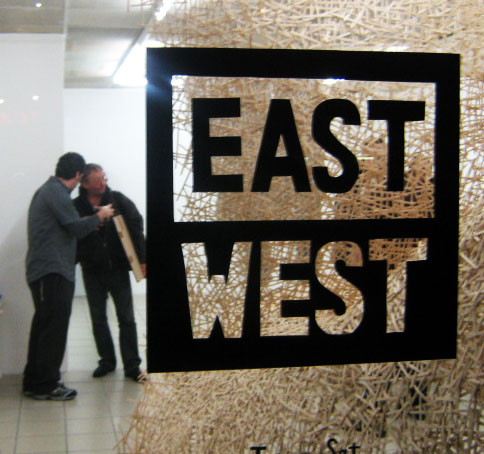 East/West storefront in Berlin, Mitte district (all photos: Jackie Friscia) Gary Wiseman - East/West is an innovative project. It is very compelling to me. The first time I heard Paul mention something about it was two years ago. Paul Middendorf - That's about right GW - Tell me about the development of the project, who you're working with, who is involved... PM - Sure. I guess the earliest incarnation of EAST/WEST happened in 2007 when galleryHOMELAND went, representing Portland, to the Art Basel Fair, in Switzerland. We did a project called Attache' Case where we brought 15 artists [work] in this case that we showed at the various fairs like Scope and we would bring it outside Art Basel, we went to Munster, Germany to see the the sculptural fair that happens every ten years, went to Documenta, presented at some places there. Through these travels we were forming many relationships. I was also, for part of the time, traveling with Leah Stuhltrager, one of the main directors of Dam, Stuhltrager. GW - The gallery you work with in Brooklyn? PM - Yah. So, basically in Basel, Switzerland we had met a lot of European [specifically] Berlin gallerists. We were fascinated by a lot of the similarities that we shared in projects and artist relations. So we started the dialog then and while we were there they were pitching Berlin and saying, 'Its great! A great city. You guys have to visit. You have to visit. And storefronts are cheap, so, you know, you might as well just get a store front because its so cheap and even if its a spontaneous project it will be fun for everybody'. So, that started getting us thinking about it. That was June of 2007. We didn't really start working on the solid concept until about a year later and then we had our final mission [statement] by last December? [Caitlin nods] The title of the project came soon after because we were both sharing the same concept of collaborating. Leah was doing it on a different level, operating as a commercial gallery in New York, and we're sort of coming from the non-profit realm so it was almost a perfect marriage of idea. 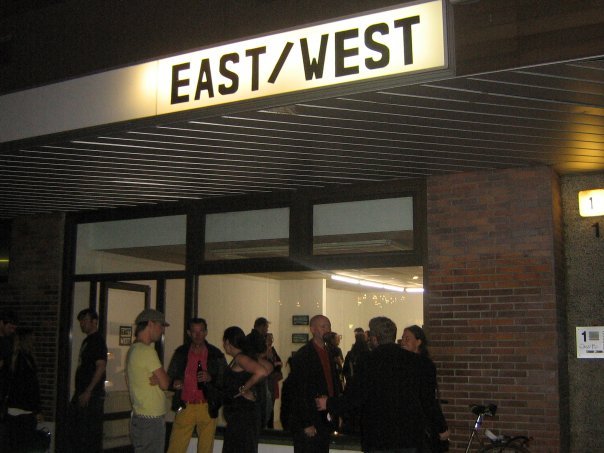 East/West opening GW - Caitlin, you recently became co-director how long have you been involved with HOMELAND? Caitlin Moore - I've been involved with HOMELAND since 2006... GW - So you have been along for the whole time? CM - Yes. The first Scratching the surface I came on and helped in whatever capacity was needed. And then after that project it was pretty much Paul and I working together, finding the space [Ford Building] and solidifying the space, mounting exhibitions and that sort of thing. GW - May be you could talk a little bit more about the history of HOMELAND so those who are not as familiar with your work have more of a context in which to place this project [East/West]? PM - I had worked with several organizations prior to that, Modern Zoo, I volunteered for Gavin [Shettler] when he had his gallery, I was one of the curators for Disjecta and one of the directors for the latest incarnation, the non-profit. I learned a lot from working with those organizations about running a space in Portland. I took a break from all of it and, you know, just sort of relaxed as an artist and then started the dialog again with Paige Saez in July of 2005. We were talking about these interesting projects that had happened in the past and been going on, artist co-ops and artist run spaces and they are not just in Portland they are all over the country and all over the world. We were thinking about these different ideas and the pros and cons of those spaces verses a larger scale organization. So, we originally started the gallery as an artist...artist pro-space [smiles]. 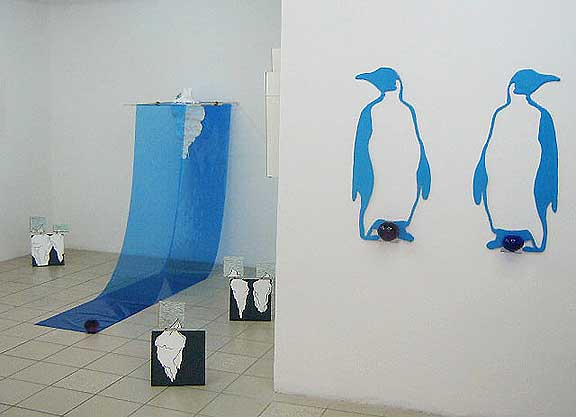 Collaborative work by Sean Healy and Joe Thurston at East/West GW - Is that the one that was on Belmont? PM - Yah, we were at S.E. 34th and Belmont and the space was, I dont know, 3 times the size of this office, 600 sq. ft. may be [looks around]. It was enough to do screenings and small shows, social practice projects, dinners and talks and stuff like that. We used that as our headquarters and then did a lot of other stuff like Scratching the Surface, that Caitlin first started working on, and we were working with a lot of the other galleries as well. So, it wasn't just about our space, we really wanted to...I guess our main goal was sort of like, 'What's going to work best for a gallery to run, but also where the artists are the highlight of it?' you know? In every gallery setting the artists are the ones that are being exhibited, but there is so much of the behind the scenes and the fund raising and getting the money for your space, or your marketing and stuff like that. From time to time artists can either be in the spotlight or they can be the secondary element and we really wanted to work closely with the artists and with the community. So it started very small and then as we grew we built staff members and helpers and collaborators and started bringing in more institutions, and then we started a residency and then we started our import export projects. As that grew we slowly started realizing that we were actually operating as a non-profit. Because our goals were not nesessarily commercial sales and a lot of our projects and even our openings were funded by private donors. It just seemed to be the model that we were headed for... CM - And the import export and residencies that you and Paige started at the 34th space really are the jumping off point for the focus of galleryHOMELAND today, with its mission of supporting the economy on a DIY grassroots level by trying to raise awareness of the [art] community that is here outside of the community, so going to Europe, going to New York, trying to get some attention focused on Portland so that the community that is here can stay here and be healthy, strong and creative. PM - And to clarify, because I think that sometimes DIY has been tossed around in so many different capacities it looses its definition. How we see DIY and how we say we still operate as DIY is that we keep our original mission and goal from when we started as a Gallery. 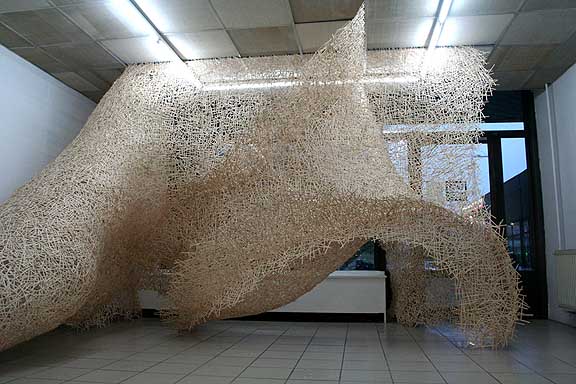 Work by Jonathan Brilliant GW - So you haven't really deviated a whole lot from your original objective? PM - Not really, we've definitely changed things as far as how we organize and how we present ourselves professionally but you know, while still keeping the artist as our focus. Then we're all running on the same parallel line [motions horizontally with hands] so there's not...[motions up and down with hands] GW - So there's not a hierarchy? PM - Yah. CM - Also for us DIY fits in best with finding a need and filling it however you can. GW - Yah, I've noticed that, when I have worked with you [in the past]. You're very open to doing whatever needs to be done. Some of the curators and galleries I have worked with tend to act like they are doing the artist a favor; a little bit...patronizing... CM - It's a very collaborative effort here. I mean, on all levels, that's how we get things done. PM - You know I think that...you know so many gallerists are artists but there are a lot of directors and institution heads that aren't artists and I am not saying that they're not creatively inclined. But I mean, there's a difference. If you are studying art history or museum practice [as opposed to] starting as a studio artist. Me and Caitlin both graduated from the same school and may be some of that is still within us. I'm still a practicing artist, she likes to say that she's not but she is. [laughing] CM - That's not true. I'm not. GW - I have noticed that Caitlin often underplays herself... PM - Uh-huh. She exhibits under the alias Gwendolyn Peppermint. [more laughing] GW - OK...do you want me to put that in there? So, you have been in Berlin for two months. Is that right? PM - Just about. I flew out on September 11, I came back the 27th, the 26th. 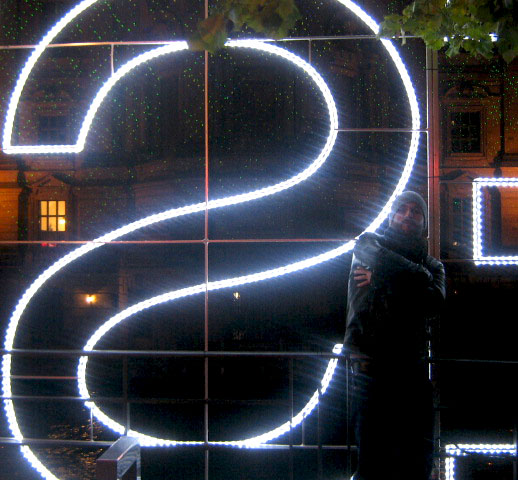 Sean Healy in Berlin (photo: Jackie Friscia) CM - So officially the opening of two exhibitions. PM - May be its been a little more than a month and a half. You know everyone always says they hit the ground running, but we were working as soon as we got there and didn't really stop until I got back here. Didn't really stop then either, but I got a few more days off than when I was there. CM - I don't think it stopped, we have just been focusing on, its important to have Paul come back and present himself to people and say, 'Look! I'm here. This is what I've done'. You can put it on the web site and you can email out, but its really important to have a first hand example. PM - Yah exactly what we were talking today...there's a lot of things that people don't know. GW - That's why I wanted to talk to you. I have followed the web site but there were so many things I was not clear on, and I thought the community should know more about it. I haven't seen any interviews... PM - We did have a blog on the old web site that we have to transfer over to the new web site which will happen in a couple days. GW - So you can be followed there? PM - Yes and since I have been gone I have done 2 blog entries for City Hall. GW - So how has it been going? Can you give a couple of highlights from Berlin? PM - It's been going great! We were taken back a little bit about how receptive people were. There are things we learned right away. In Europe and Germany...they just do business differently. In the states you show up to some event and you immediately start chatting with somebody about business or a project, but you just have to take different steps [in Europe]. It's more subtle. So there is a lot of proving ground that you have to go through first. When we first got there we were not only making the contact list of hundreds of people (based on the recommendations of Portland artists and institutions, New York artists and institutions, people we knew who were living there from the states and basic internet research about who did what great things.) We also landed and opened the same week as all of the art fairs in Berlin. Art Forum. ABC Contemporary [which is] sort of an emerging artist fair that a lot of blue chip galleries participate in with their younger artists. Berlin Lista. There were about as many fairs as Art Basel, Miami. There was just a lot going on. So that was helpful for us too. GW - So you got a lot of exposure from those things? PM - Yah, Mainly just with contacts, meeting people, going to openings... GW - Being the HOMELAND missionary. PM - Exactly. We started working with Gallery Open which is a great gallery there in Berlin and Alexandra Rockelmann has been amazing to work with. She is the director. She has been helping us with the Berlin side of the artists, filling in some of those spots and helping us meet other people, so a lot of it has been meeting folks like her and Ole Ukena who is one of the artists here in [the current HOMELAND Exhibit] in Portland. He is a Berlin artist living and working there. He also just started a non-profit funnily enough called CIA. Basically he is working with a cultural anthropologist on projects with children that happen in Berlin and other spots in Europe, Southern asia and Africa. GW - Art related projects? PM - Yah. Art as a kind of communication tool. So he's been really great to work with. Garten studios Malte and Per the directors there, they basically run a social practice gallery so a lot of lectures and talks and everything focuses around cooking. So that would be on the gallery/ artist run spaces side, but we have also been connecting with institutions - we have started communications with the academy of art in Berlin; we are starting to work with people who are in the academic field of various art schools over there; other galleries and other non-profit spaces. Its been going really really well. And a lot of those people have contacted us! May be they have already heard from people, towards the end of our trip, my last trip, that they should get in contact with us. It has been really fascinating the people who have been coming through the gallery. Even Portland people. Within the first couple of weeks we had ten visitors from Portland. GW - Reed [Blue Cranes] and Chris Hudson were over there, right? RW - Yah. Blue Cranes played our opening. Brad and Nora Winter were over there. Then we had random people who had heard from a museum docent here in Portland, 'Oh, your going over to Berlin? You should check out this space'. We met a lot of really interesting people that way. We have really started building that community over there, strong structure for the projects. In fact we are in the first steps of expanding our space starting in January 2010. 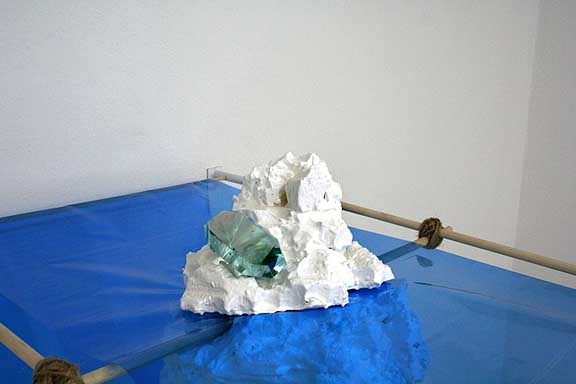 detail of collaborative work by Sean Healy and Joe Thurston GW - In Berlin? CM - Yes. We are doubling our space. PM - Yah, we are doubling our space. GW - So moving to a bigger one? PM - Yah. We got offered an opportunity in the outskirts of Kruetzberg in an artist building. We've got the predominant main space of the building and then there's artist studios above and a little cafe run by the woman who owns the building. GW - Is the new building donated or are you paying rent? PM - We're paying rent and it is cheaper than the space we had in Mitte and twice as big. CM - And there is potential to have studios for the people we bring in from Portland, to work in, that are attached to the gallery so it just seems to be a little more... PM - It definitely fits in more with the project because, the other space was beautiful, and it was in Mitte the SOHO of Berlin, but it was definitely a store front space with apartments above us and a dry cleaner on one side and an Italian restaurant on the other. It limited what...I guess the energy was different, because it was a store front whereas this is a store front but it is in an artist building. So that ties in directly with working with Berlin artists, 'cause we're in an artist building. GW - So you are becoming more integrated into the community itself. PM - Exactly. Then its not just us doing things in the building, we're working with everybody. Then the space is different in the sense that the way the space is divided we can do more film and video screenings or music or experimental music or performance, new media will work better in this space. There is a lot of things we are really excited about and we'll give more details about that as soon as we solidify things, but everything, we've gotten it all taken care of and we are really excited. GW - So the artists that are coming over from Portland will experience something more like a residency? CM - There's been a lot of language in the press releases already about that because we're not just taking the work over we're inviting artists to come over and stay in our space and give them dinner, take care of them and have them be there for the opening, which is so much stronger than just taking the work over. This does give us more ability to provide more of a residency aspect. It's not just living and exhibition space, its a work space as well. PM - Its also easier for the artist to get involved with the community rather than relying on us to present them to curators and institutions because they are already in the neighborhood, in this building. CM - It gives each artist a better ability to take advantage of the fact that they are in Berlin, that they can do something with that if they so choose. If they want to develop some work there or something like that, have some space on their own to develop relationships. GW - Which is the point of the project. CM - That is exactly the point of the project. 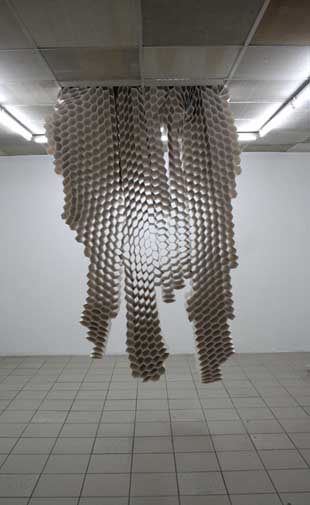 Eric Hollander at East/West GW - Are you doing anything to commemorate the 20th anniversary of the Berlin Wall? PM - Well, this show [Portland], there are probably loads of shows I would think. There's events happening at city hall in Portland about the falling of the wall, then Work Sound did a show as well and our show ties in with that too. GW - The current show here at HOMELAND? PM - Yes. This show is basically artists living and working in Berlin at one time or another, whether it be Portland artists living there and working or Portland based artists that had been over there, about half of the artists in the show are still living and working over in Berlin. We ended up doing a show that just focuses on the Berlin artist community culture. GW - And what is the current exhibition called? And the translation? CM - Kunsthalle: Deutschland nach Portland. Art Space, Germany to Portland PM - East/West are not doing any events that specifically tie into the falling of the wall. I know that Leah is going to these events and tying us in that way. Again a lot of that was decided due to the space we had, that commercial space, the storefront, that limited the events that we had. I think if we had been into our new space we would have held some sort of event there that ties in with [the Wall], but its hard not to get involved with what is happening over there. It involves the whole city. GW - What is the sq. ft. of the new space? PM - The old space was a little over 1000. The new space is around 1400 sq. ft., but there are two floors. There is the main space and then there is an amazing cellar space. There is a giant door that opens up and these stairs go down. It is a beautiful space to use for, I don't know, studios, workshops, events. GW - So does that mean you will expand your programing or just give artists that come over more space? PM - Well definitely it is going to expand our programming. Because the time frame is going to be different. We are no longer leaving in April. We'll have a presence there well into the summer. With options to stay even longer. GW - OK, so I didn't know that... PM - Well its all new! CM - We haven't really put out any press releases. Well there is actually, there is a press release... PM - There is a press release coming out. This is just a hint of things to come. CM - It hasn't been officially announced yet, however we are staying until mid April mid June, but there is a significant opportunity to extend it for many many months beyond that if we should so choose. GW - Congratulations. That's awesome. Good work. PM and CM - Thank you GW - How is the East/West project funded? PM - Well that is another aspect that has been really surprising. Based on the [fact that] we are not just doing import and export from Portland to other U.S. cities, but we're actually doing it internationally and we're working with all the galleries that represent the artists that we are showing and we are encouraging the artists to come [to Berlin] for the project - because it is important, as we said earlier - that they [Portland artists] work closely with the artists from New York and also with the German artists and [German] community, I think people are really getting behind it. I mean the amount of successful fundraising that we have done since we have been there has been through the roof. GW - So you have done fundraising activities in Berlin? CM - Yeah we started a Kickstarter. PM - We did a Kickstarter, online fundraiser that raised, just about $3000 just to pay for artists food. Just for dinners, for the visiting artists. We have been working with other institutions and galleries on grants over there through different universities and for public art projects and sustainability [of East/West]. Our events here have gone over really well too. CM - We have some more really great fundraisers coming up. We are working on a bake sale [called Scratch] that we are going to have at the Cleaners on the 21st of November and we've got Cassie Adams-Harford heading that up and she has invited members of the cooking community. Clyde Commons is donating ice cream pints, Gabe from LePigeon is donating something from the menu, one of the deserts, [Micah Paredes] from Beast is involved. We are working really hard on creating a diverse fundraising platform because everyone is looking for money and we just want to, I mean part of our mission in supporting the community is not taxing that same community over and over again. So we are trying to open it up. PM - We're basically routing the majority of our own personal fundraising towards the East/West project. So you know, the proceeds of these events go directly into this project. The majority I would say. Same with Leah working her end. A lot of her private sponsors and donors are also, she's directing their funds straight into the project so it is a very collaborative fundraising effort. That has really helped out, working both angles. GW - So most of your budget then comes from the greater Portland community, the contacts you've made in Berlin and fundraisers? CM - And grants. Fundraisers [nodding]. PM - Like we talked about before, we had the idea of the project ages ago but we solidified our space and signed the lease like a month before we got there. So there are certain parts of the fundraising and the grant writing that couldn't be done until we were already over there, until we had already gotten a few shows under our belts. So now we're starting to file for these grants and to work with these institutions. That money will come in towards the end of the project to strengthen the project as a whole and then there are the possibilities of extending the project. Berlin is just the beginning. We're looking at other cities in Europe at the moment, we're looking into South America, we have a bunch of other project cities on the horizon that we are starting in the direction of now. We are already starting to take some trips to make some contact with people that we know in these other cities, so I guess it is the foundation that we're building and the fundraising too, is for those other projects. GW - I am very interested in this concept of involving the businesses of a community in funding art and collaborating with organizations such as HOMELAND in making things happen in the cultural landscape. PM - We are very excited to say that City Hall has definitely been helping us out with sponsorship and endorsing the project which has been helping with our financial support, because City Hall signed off on our endorsement letter then Burrow Hall in Williamsburg signed off on that as well. So that has been helping with our institution connections over in Berlin, but we are also supported by Stumptown Coffee and are proud to be serving Stumptown Coffee in Berlin, and Foxfire tea which is our local teashop right here in the Ford building. CM - So our artists and curators can wake up and have a cup of Stumptown Coffee. GW - how do they get it over there [the coffee]? CM - They are shipping it. So an organization like Stumptown already has a pretty solid connection in the art world, with the curation program. GW - Mostly artists work there. CM - Exactly. By working with businesses in the community it fundamentally expands your audience. It gives them a stake in what you're doing, and a stake in the arts community. GW - Which is good for everybody. CM - Which is very good for everybody and it opens the community up to feeling they can connect to the art world which is very easy to do, but often people need an invitation. GW - There has been a lot of talk over the last few years about the creative economy stimulating the greater economy. You seem to have taken this benevolent special forces "Green Beret" sort of role in establishing an "Outpost" and making these exploratory missions into the national and international realms, which is interesting given your name and logo and the way you have presented yourself... CM - Thats how we should do our staff photos! PM - Brainstorming. GW - Is that just happenstance or is this an intentional design? Was it a reactionary gesture? PM - No, and that is something that, you know, when we started HOMELAND, I was telling someone this at our opening the other night. So, we had three working titles for HOMELAND before we decided. They were galleryHOMELAND, There was Lucky Penny and there was Home Ec. What we didn't know was there was already a business in the neighborhood called Home Ec. Lucky Penny I loved but Paige had a dog named Lucky. GW - And pennies are soon to be obsolete. PM - Exactly. So, [the name] HOMELAND we really threw it around back and forth and one of the first things we got was, 'HOMELAND has such negative connotations.' But the earlier Import export projects I did on my own were called Manifest Artistry which was based off an element of manifest destiny minus all the bad things that happened. It was about expansion and growth, expanding the horizons and doing things for the good of mankind. galleryHOMELAND is more focusing on the "Motherland" or the "HOMELAND". CM - In the best aspects of it. When the gallery was formed it definitely carried a different connotation under a different administration, but it doesn't really have to... GW - It seems to have outlived that, at least in our community. [agreement] PM - Then the irony of what we're doing over there is just... CM - Again it really underscores the import export theme. Its [HOMELAND] is about place. We're about specific place. We're grown out of a specific community with, what we see as a specific need. PM - Maybe someday we will open up a space in Germany called Gallery Fatherland [chuckling]. GW and CM - [nervous laughter] GW - Woah. PM - You know, we'll see [smiling]. We definitely see the outpost, if you will. I'd say more of the old-timey outpost though. CM - The frontiers. PM - Yah the frontiers, forts... GW - Which has its own negative connotations. CM - Colonialism! PM - Sure, Yah, I always saw it as good hard work and calloused hands GW - Well, I'm a quarter Native American, so... CM - Oh, there you go. PM - Working with your local [laughter obscures] making pies. 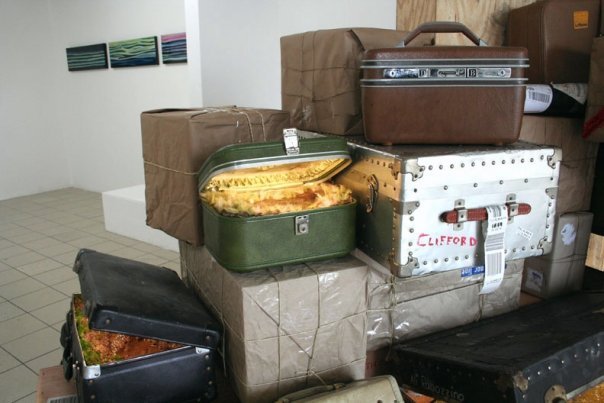
GW - How were the artists that you are taking to Berlin chosen? Did you already have relationships with them? PM - Yah, all of them we've had relationships with, its based on a couple of things. Who we've worked with on a regular basis. Its hard, you know, you and me and Caitlin, we have so many connections with people in Portland in the artist community Essentially we could make a list of 200 people. It started off having 6 artists and then we ended up with 10, so we we're trying to close the door on it because we knew there would be other opportunities for other artists to come and visit and, if it wasn't a month long exhibition, may be do a project there or something. A lot of it was that a few of these people have already done projects internationally. A few of them haven't at all. They have just been our Portland heroes. It was based off where they're at in their career, some have not been out of school that long. CM - That's true for some but then you look at Vanessa Renwick, she does amazing self promotion and has an amazing resume' that she has built in the past ten years. I just felt very strongly that German audiences would love her work. It makes perfect sense for Berlin. She is really excited, I think she had been in Berlin years ago and tried to go back but hasn't been able to make it. Those two things combined, I like her work a lot and... PM - It fits. The other part of it was that we did have a broader selection too, but then me and Leah Stuhltrager curated that down a little bit, based off who she was bringing and who would fit well together. We wanted each show to form its own language. GW - Each show has an artist from Brooklyn, Berlin and Portland? PM - Yes. At least one. Lately its been about 2 artists from each city. We are curating the work so it fits really well together. GW - How has it been for you Caitlin being here while Paul is over there? What has your role developed into? CM - What I am spending a lot of time doing is strengthening the fundamentals of galleryHOMELAND. I am working on developing new roles within the organization so that we will be able to travel more, Paul and I, so that we will have people who are capable and energetic about mounting exhibitions if we're not here. People like Cassie who are excited about finding fundraising projects that people are excited about. 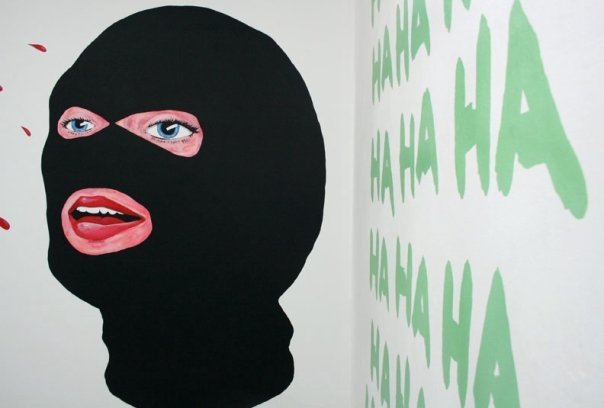 Work by Josh Arseneau at East/West PM - Emily Henderson is another one of our champions here at galleryHOMELAND. CM - Emily is associate director here. She is working very closely on, as much as we can do, strengthening our relationships with German organizations in Portland and then using those to reach out to German organizations in Berlin. A lot of the efforts [here] are mirroring what Paul is doing over there, we're just doing it on this side so we can meet in the middle.With building some professional roles we're also working on getting the organization to a point where we can have internships and offer substantive education, real world experience. Then we can start to invite some institutions to work with us and to get their support and to give them something that they can't really get anywhere else. I think we do have the potential to offer a unique vision onto how you can be an artist or arts professional and start something from scratch and have it be successful. GW - So, you are working towards creating a platform to teach others to do what you did? PM - A platform through galleryHOMELAND and East/West to not only host visiting artists but will host visiting students too that will become our future artists of Portland or beyond. CM - One of the things we see our organization as is...we would not necessarily suffer from more organizations like ours. GW - You are more interested in a cooperative relationship? CM - Well, the more voices will only strengthen getting that new attention [outside of PDX]. There is so much that needs to be done with the larger community, everybody else that is not really aware of the arts. To have more voices you're going to have to reach out more creatively and to do that hopefully we can begin to educate the community and invite them to see art in a different way, empower them to be able to address it, which is what happens here, at this building, that's why it's so special we're in the Ford Building. A lot of folks, though they are creative in certain respects, photographers, visual arts oriented folks, there are also a lot of wedding photographers and portrait photographers, a lot of traditional ceramic crafts that aren't integrated with the visual arts. We have the opportunity here [HOMELAND] because [our gallery] is right in front of the elevator, where people who have absolutely (I would almost guarantee) have never walked into a contemporary art space much less a museum unless they were in school, who are excited and engaged and asking us, 'what is happening next month?' and being very vocal about whether they love it or if they are having issues with it. Discussing it in a way they never would have if we were not here. So I think the more of "us" that are out there, the more we will have the opportunity to have those conversations and really excite people about what we are doing. PM - We are really excited by the direction and the speed that we're moving, both galleryHOMELAND and East/West. We are strengthening our roles within the community, the creative economy, we're strengthening our own skills as individual people. Running a space in Portland is one thing but also helping to run this space in Berlin with Leah Stuhltrager and her staff as well, its a learning curve. It takes time, but we have been pleased with how everything has been going. Posted by Gary Wiseman on November 13, 2009 at 14:27 | Comments (0) Comments Post a comment Thanks for signing in, . Now you can comment. (sign out)
(If you haven't left a comment here before, you may need to be approved by
the site owner before your comment will appear. Until then, it won't appear
on the entry. Thanks for waiting.)
|
| s p o n s o r s |
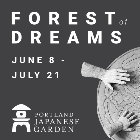 |
 |
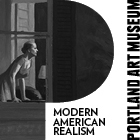 |
 |
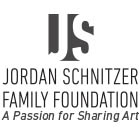 |
 |
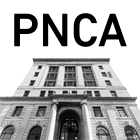 |
 |
 |
 |
 |
 |
 |
 |
 |
 |

|
Site Design: Jennifer Armbrust | • | Site Development: Philippe Blanc & Katherine Bovee | |
